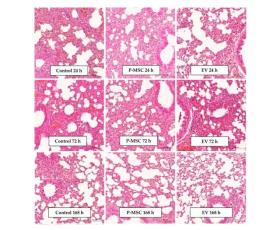Human Placental Mesenchymal Stem Cells and Derived Extracellular Vesicles Ameliorate Lung Injury in Acute Respiratory Distress Syndrome Murine Mode

This study investigates the therapeutic potential of human placental mesenchymal stem cells (P-MSCs) and their extracellular vesicles (EVs) in a murine model of acute respiratory distress syndrome (ARDS), a condition with growing relevance due to its association with severe COVID-19. We induced ARDS-like lung injury in mice using intranasal LPS instillation and evaluated histological changes, neutrophil accumulation via immunohistochemistry, bronchoalveolar lavage fluid cell count, total protein, and cytokine concentration, as well as lung gene expression changes at three time points: 24, 72, and 168 h. We found that both P-MSCs and EV treatments reduced the histological evidence of lung injury, decreased neutrophil infiltration, and improved alveolar barrier integrity. Analyses of cytokines and gene expression revealed that both treatments accelerated inflammation resolution in lung tissue. Biodistribution studies indicated negligible cell engraftment, suggesting that intraperitoneal P-MSC therapy functions mostly through soluble factors. Overall, both P-MSC and EV therapy ameliorated LPS-induced lung injury. Notably, at the tested dose, EV therapy was more effective than P-MSCs in reducing most aspects of lung injury.
Full article: https://www.ncbi.nlm.nih.gov/pmc/articles/PMC10706384/
This study investigates the therapeutic potential of human placental mesenchymal stem cells (P-MSCs) and their extracellular vesicles (EVs) in a murine model of acute respiratory distress syndrome (ARDS), a condition with growing relevance due to its association with severe COVID-19. We induced ARDS-like lung injury in mice using intranasal LPS instillation and evaluated histological changes, neutrophil accumulation via immunohistochemistry, bronchoalveolar lavage fluid cell count, total protein, and cytokine concentration, as well as lung gene expression changes at three time points: 24, 72, and 168 h. We found that both P-MSCs and EV treatments reduced the histological evidence of lung injury, decreased neutrophil infiltration, and improved alveolar barrier integrity. Analyses of cytokines and gene expression revealed that both treatments accelerated inflammation resolution in lung tissue. Biodistribution studies indicated negligible cell engraftment, suggesting that intraperitoneal P-MSC therapy functions mostly through soluble factors. Overall, both P-MSC and EV therapy ameliorated LPS-induced lung injury. Notably, at the tested dose, EV therapy was more effective than P-MSCs in reducing most aspects of lung injury.
Full article: https://www.ncbi.nlm.nih.gov/pmc/articles/PMC10706384/